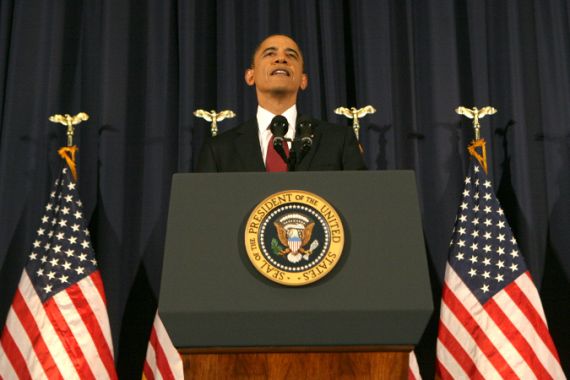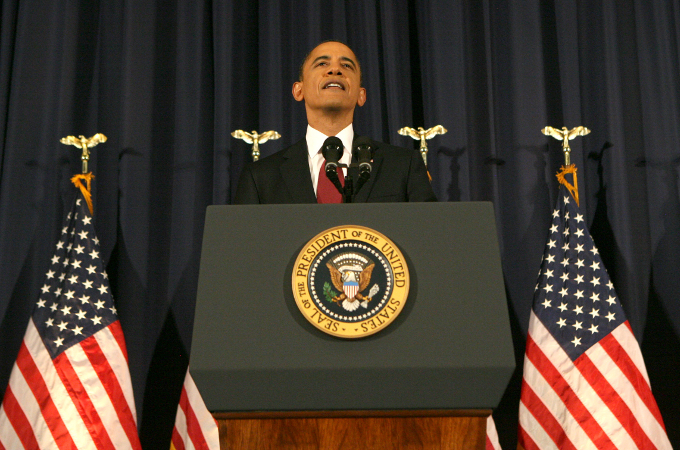Obama’s test for Arab interventions
The US president’s speech on Libya implicitly addressed the criticism that recent policies have been hypocritical.

 Obama dealt mostly with the operational criticisms of the Libya campaign, that it has been too slow or too much [EPA]
Obama dealt mostly with the operational criticisms of the Libya campaign, that it has been too slow or too much [EPA]Barack Obama’s election was supposed to usher in an era of hard-headed realism for US foreign policy, but his idealistic side was on display during Monday night’s speech about Libya.
The speech was in many ways a classic Obama argument: The president portrayed his Libya policy as a reasonable centrist path, a third option between the “false choice” of unilateral regime change and isolationism. It had echoes of his December 2009 speech announcing a new Afghanistan strategy, which used a similar frame: there was complete withdrawal, and there was open-ended war, and in between the two was Obama’s strategy.
Obama did not try to sell US intervention in Libya as a key national interest (probably an impossible task anyway, since his own defence secretary said over the weekend that it wasn’t). Instead he appealed to morality – to idealism – calling a failure to act in Libya morally unacceptable.
“It is true that America cannot use our military wherever repression occurs. And given the costs and risks of intervention, we must always measure our interests against the need for action,” Obama said. “But that cannot be an argument for never acting.”
And while Obama did not articulate a grand strategy for US policy in a rapidly-changing Arab world, he did implicitly address the accusations that America’s responses have been hypocritical.
Too slow, too much?
Much of the speech, though, focused on the operational criticisms of the bombing campaign in Libya; he dwelled at length on the specific circumstances in Libya, describing it as an extraordinary situation which merited an extraordinary response.
Some accused the US of dragging its feet, waiting to act until Libyan leader Muammar Gaddafi pushed the rebels back to the gates of Benghazi. Obama contrasted the international reaction with the response to the Bosnian genocide of the 1990s, when it took the United Nations a full year to approve a no-fly zone.
Others reached the opposite conclusion: that the US rushed into Libya without a clear strategy for getting out. Obama, as he did with his Afghanistan strategy, sought to portray himself as a “reluctant warrior”; indeed, he spent the beginning of Monday’s speech outlining what the US did to avoid military action.
“We froze more than $33bn of the Gaddafi regime’s assets… we broadened our sanctions, imposed an arms embargo, and enabled Gaddafi and those around him to be held accountable for their crimes,” he said. “I made it clear that Gaddafi had lost the confidence of his people and the legitimacy to lead.”
Similarly, Obama has faced criticism that Western policy in Libya both goes too far (by bombing Gaddafi’s military positions, not simply enforcing a no-fly zone) and does not go far enough (by not explicitly calling for regime change).
He argued against the former by warning of the threat Gaddafi’s army poses to civilians; he argued against the latter by invoking America’s disastrous experiment with regime change in Iraq.
A difference of degree
Then there is the question of double standards – whether the US action in Libya is based on the same set of principles that have guided its response to other Arab uprisings.
“Wherever people long to be free, they will find a friend in the United States,” Obama said, a line that surely rings hollow in places like Egypt, where the US initially stood by former president Hosni Mubarak even as pro-democracy activists battled for his ouster.
He also stressed America’s “opposition to violence directed against one’s own citizens”; yet in US allies like Yemen and Bahrain, where governments have deployed lethal force against unarmed protesters, American opposition has been limited to mild rhetorical condemnation.
Obama did not directly address that contradiction. But he did, implicitly, draw a line between the Libyan uprising and those in other Arab countries.
“Gaddafi declared that he would show ‘no mercy’ to his own people,” Obama noted. “He compared them to rats, and threatened to go door to door to inflict punishment… [Benghazi] could suffer a massacre that would have reverberated across the region and stained the conscience of the world.”
Yemen’s president deployed snipers against his own people, and the Bahraini government sent security forces to open fire on funerals. But neither threatened bloody reprisals against the population of a major city; nor do they have a history, as Gaddafi does, of executing thousands of political prisoners in a single day.
Obama did not articulate a broader vision for America’s response to the Arab revolts. But on the narrow question of whether the US would intervene militarily, his speech suggested the answer would be “no”; and that the test would not be whether a government brutally cracks down on its own people, but the degree to which it does.